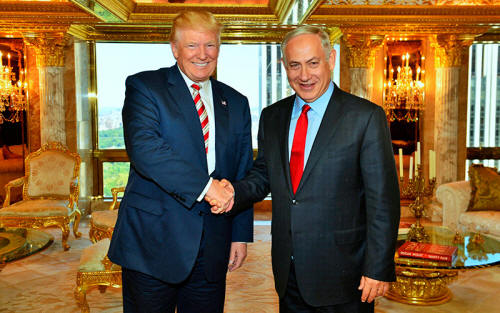|
by Whitney Webb from MintPressNews Website
Donald Trump shakes hand with Israeli Prime Minister Benjamin Netanyahu in New York.
(Kobi
Gideon-GPO/AP) that has even top bankers on edge, the Trump administration's apparent desire to wage new wars is no surprise. Without a new military conflict, the permanent war economy of the United States could risk tanking entirely.
In a scenario eerily reminiscent of 2013, the United States government, along with several other pro-intervention governments that have been funding and arming rebel and terror groups like the Al Nusra Front, have called for action to be taken against Syrian President Bashar al-Assad, despite the fact that it has been internationally recognized for years that the Syrian government has no chemical weapons.
On Wednesday, Nikki Haley, the U.S. ambassador to the UN, stated that the U.S. would be "compelled" to take action against Assad if the UN fails to do so, which is a near-certainty given the veto power of both China and Russia on the UN security council.
However, Haley didn't stop there, going on to blame both Russia and Iran for the Idlib attack, as well as stating,
Trump and others in his administration have offered similar rhetoric, with Trump stating the following at a Wednesday press conference:
Vice President Mike Pence told Fox News that,
Those "hints" turned to reality early Friday morning when the U.S. launched 59 tomahawk missiles at a Syrian airbase allegedly connecting to the Idlib gas attack on Tuesday.
Following the launch of airstrikes against the Assad regime, it has become clear that it is the Trump administration that has no interest in peace, perhaps out of necessity.
As has been noted by political scientists and analysts for decades, the U.S. is a permanent war economy, entirely dependent on military and defense spending in order to generate economic growth.
As Belgian political scientist Kris Roman told Sputnik in 2015:
With economic warning signs everywhere and growth slowing down substantially, Trump has no choice but to involve the U.S. in another war in order to "make America great again."
As Eric Peters, CIO of the prominent hedge fund One River Asset Management, said in mid-March, the odds of Trump succeeding in his domestic agenda is,
The state of the U.S. economy is growing increasingly worse, as economic calamity already appears to be unfolding in ways unseen since the 2008 financial crisis.
The bond market is crashing, the U.S. retail sector is collapsing and subprime auto loan losses are at their highest level since the last crisis.
The last is particularly troubling, as these subprime auto loans, like the subprime mortgages of 2008, were bundled together and sold to investors as "securities," meaning banks are in nearly the same position as they were in 2008 - except now they are much, much larger.
Combine this with record low labor force participation, record national debt and slow economic growth and things begin to look increasingly bleak.
Though the economic outlook has been dim for sometime, the stock market has consistently been a bright spot since the last crash, largely thanks to central bank policies that were enacted after 2008.
While stocks soared after Trump's election, the so-called "Trump rally" took a nose dive on March 21, culminating in the year's worst day for stocks so far.
The market still has yet to recover, with stocks continuing to perform poorly overall - sparking worry from investors and even big time bankers as investors pulled 14.5 billion dollars from U.S. stocks in a week.
Things only became worse after the most recent Federal Open Market Committee (FOMC) meeting, where the Federal Reserve announced it was focused on deflating what "some members" of the FOMC had called a stock bubble, additionally warning that stock prices are overinflated.
The bubble has been known for years, as Federal Reserve money printing, particularly "quantitative easing," has pumped up stock prices and resulted in one of the longest bull markets in history - one that will end as soon as the bubble bursts.
The negative response of the financial sector was immediate.
On Tuesday, Jamie Dimon - CEO of JP Morgan and Chase bank - said "something is wrong" with the U.S. economy in his annual letter to shareholders.
A day later, Mark Cudmore, Bloomberg's former FX trader, stated that,
With things so close to breaking down, Trump needs to act quickly to boost economic growth, lest the massive bubble the Federal Reserve has created since the 2008 crisis finally explodes and the entire economy careens out of control.
Considering the U.S.' dependence on war for economic growth, it is therefore convenient that Trump and his administration are already instigating a new war against not just Syria, but also Iran, Russia and whoever else they choose to target.
Trump will have to choose between making the U.S. economy "great again" or giving up his anti-interventionist campaign promises due to the permanent war economy - he cannot have both.
But the actions he and his administration have taken so far indicate that the choice has already been made...
|


